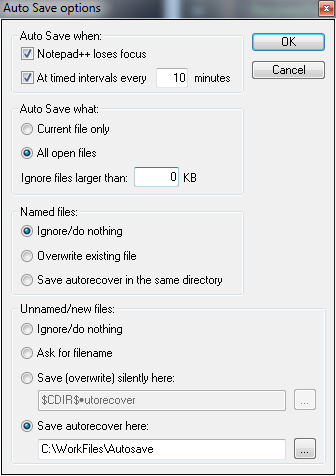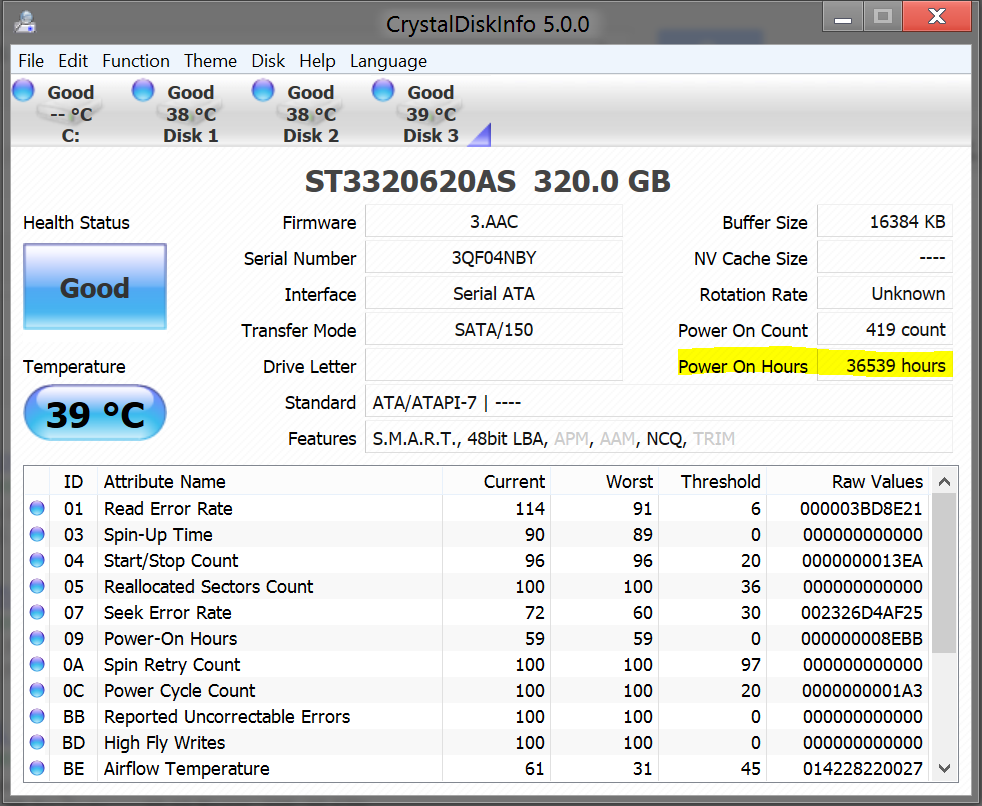As of the Hyper-V Version: 6.2.9200.16384, Ubuntu 12.04 x86_64 performs very slow as a guest os. I switched to CentOS 6.2 x86_64 and performance was dramatically increased. It should be noted that “Linux Integration Services Version 3.4 for Hyper-V” was installed on the CentOS system, but not the Ubuntu system. I’ll investigate this at a later date.
I’ll post a unixbench of both VMs when I get a maintenance window. But for now, examine these load averages. Both running a minecraft server (Bukkit 1.4.6-R0.1) of the same world with the same amount of people. Both had 4GB of ram and 4 CPUs.
Ubuntu 12.04 x86_64: load average: 2.65, 2.92, 2.47
CentOS 6.2 x86_64: load average: 0.14, 0.11, 0.09
—————————–
EDIT 12/27/2012
UnixBench Ubuntu 12.04
BYTE UNIX Benchmarks (Version 5.1.3)
System: u1204vm: GNU/Linux
OS: GNU/Linux -- 3.2.0-35-generic -- #55-Ubuntu SMP Wed Dec 5 17:42:16 UTC 2012
Machine: x86_64 (x86_64)
Language: en_US.utf8 (charmap="UTF-8", collate="UTF-8")
CPU 0: Intel(R) Core(TM) i7-3770 CPU @ 3.40GHz (6799.9 bogomips)
Hyper-Threading, x86-64, MMX, Physical Address Ext, SYSENTER/SYSEXIT, SYSCALL/SYSRET
CPU 1: Intel(R) Core(TM) i7-3770 CPU @ 3.40GHz (6801.6 bogomips)
Hyper-Threading, x86-64, MMX, Physical Address Ext, SYSENTER/SYSEXIT, SYSCALL/SYSRET
CPU 2: Intel(R) Core(TM) i7-3770 CPU @ 3.40GHz (6801.7 bogomips)
Hyper-Threading, x86-64, MMX, Physical Address Ext, SYSENTER/SYSEXIT, SYSCALL/SYSRET
CPU 3: Intel(R) Core(TM) i7-3770 CPU @ 3.40GHz (6801.4 bogomips)
Hyper-Threading, x86-64, MMX, Physical Address Ext, SYSENTER/SYSEXIT, SYSCALL/SYSRET
12:26:39 up 3 days, 10:50, 1 user, load average: 0.31, 0.14, 0.08; runlevel 2
------------------------------------------------------------------------
Benchmark Run: Thu Dec 27 2012 12:26:39 - 12:56:13
4 CPUs in system; running 1 parallel copy of tests
Dhrystone 2 using register variables 44781167.7 lps (10.0 s, 7 samples)
Double-Precision Whetstone 3176.1 MWIPS (16.1 s, 7 samples)
Execl Throughput 2053.4 lps (29.9 s, 2 samples)
File Copy 1024 bufsize 2000 maxblocks 1451068.7 KBps (30.0 s, 2 samples)
File Copy 256 bufsize 500 maxblocks 179747.9 KBps (30.0 s, 2 samples)
File Copy 4096 bufsize 8000 maxblocks 1079491.1 KBps (30.0 s, 2 samples)
Pipe Throughput 889723.3 lps (10.0 s, 7 samples)
Pipe-based Context Switching 147545.5 lps (10.0 s, 7 samples)
Process Creation 4040.6 lps (30.0 s, 2 samples)
Shell Scripts (1 concurrent) 4485.5 lpm (60.1 s, 2 samples)
Shell Scripts (8 concurrent) 2245.5 lpm (60.0 s, 2 samples)
System Call Overhead 1961736.6 lps (10.0 s, 7 samples)
System Benchmarks Index Values BASELINE RESULT INDEX
Dhrystone 2 using register variables 116700.0 44781167.7 3837.3
Double-Precision Whetstone 55.0 3176.1 577.5
Execl Throughput 43.0 2053.4 477.5
File Copy 1024 bufsize 2000 maxblocks 3960.0 1451068.7 3664.3
File Copy 256 bufsize 500 maxblocks 1655.0 179747.9 1086.1
File Copy 4096 bufsize 8000 maxblocks 5800.0 1079491.1 1861.2
Pipe Throughput 12440.0 889723.3 715.2
Pipe-based Context Switching 4000.0 147545.5 368.9
Process Creation 126.0 4040.6 320.7
Shell Scripts (1 concurrent) 42.4 4485.5 1057.9
Shell Scripts (8 concurrent) 6.0 2245.5 3742.6
System Call Overhead 15000.0 1961736.6 1307.8
========
System Benchmarks Index Score 1108.3
------------------------------------------------------------------------
Benchmark Run: Thu Dec 27 2012 12:56:13 - 13:25:45
4 CPUs in system; running 4 parallel copies of tests
Dhrystone 2 using register variables 154446771.7 lps (10.0 s, 7 samples)
Double-Precision Whetstone 15728.0 MWIPS (13.0 s, 7 samples)
Execl Throughput 5584.7 lps (29.6 s, 2 samples)
File Copy 1024 bufsize 2000 maxblocks 1143792.2 KBps (30.0 s, 2 samples)
File Copy 256 bufsize 500 maxblocks 349687.8 KBps (30.0 s, 2 samples)
File Copy 4096 bufsize 8000 maxblocks 3281852.5 KBps (30.0 s, 2 samples)
Pipe Throughput 8111911.1 lps (10.0 s, 7 samples)
Pipe-based Context Switching 1301692.0 lps (10.0 s, 7 samples)
Process Creation 53932.0 lps (30.0 s, 2 samples)
Shell Scripts (1 concurrent) 14498.0 lpm (60.0 s, 2 samples)
Shell Scripts (8 concurrent) 2048.2 lpm (60.1 s, 2 samples)
System Call Overhead 11535804.1 lps (10.0 s, 7 samples)
System Benchmarks Index Values BASELINE RESULT INDEX
Dhrystone 2 using register variables 116700.0 154446771.7 13234.5
Double-Precision Whetstone 55.0 15728.0 2859.6
Execl Throughput 43.0 5584.7 1298.8
File Copy 1024 bufsize 2000 maxblocks 3960.0 1143792.2 2888.4
File Copy 256 bufsize 500 maxblocks 1655.0 349687.8 2112.9
File Copy 4096 bufsize 8000 maxblocks 5800.0 3281852.5 5658.4
Pipe Throughput 12440.0 8111911.1 6520.8
Pipe-based Context Switching 4000.0 1301692.0 3254.2
Process Creation 126.0 53932.0 4280.3
Shell Scripts (1 concurrent) 42.4 14498.0 3419.3
Shell Scripts (8 concurrent) 6.0 2048.2 3413.6
System Call Overhead 15000.0 11535804.1 7690.5
========
System Benchmarks Index Score 3936.3
UnixBench CentOS 6.2
BYTE UNIX Benchmarks (Version 5.1.3)
System: x1CenVM: GNU/Linux
OS: GNU/Linux -- 2.6.32-279.19.1.el6.x86_64 -- #1 SMP Wed Dec 19 07:05:20 UTC 2012
Machine: x86_64 (x86_64)
Language: en_US.utf8 (charmap="UTF-8", collate="UTF-8")
CPU 0: Intel(R) Core(TM) i7-3770 CPU @ 3.40GHz (6799.8 bogomips)
Hyper-Threading, x86-64, MMX, Physical Address Ext, SYSCALL/SYSRET
CPU 1: Intel(R) Core(TM) i7-3770 CPU @ 3.40GHz (6799.8 bogomips)
Hyper-Threading, x86-64, MMX, Physical Address Ext, SYSCALL/SYSRET
CPU 2: Intel(R) Core(TM) i7-3770 CPU @ 3.40GHz (6799.8 bogomips)
Hyper-Threading, x86-64, MMX, Physical Address Ext, SYSCALL/SYSRET
CPU 3: Intel(R) Core(TM) i7-3770 CPU @ 3.40GHz (6799.8 bogomips)
Hyper-Threading, x86-64, MMX, Physical Address Ext, SYSCALL/SYSRET
02:14:07 up 1 day, 4:57, 2 users, load average: 0.47, 0.37, 0.21; runlevel 5
------------------------------------------------------------------------
Benchmark Run: Thu Dec 27 2012 02:14:07 - 02:42:36
4 CPUs in system; running 1 parallel copy of tests
Dhrystone 2 using register variables 43284217.6 lps (10.0 s, 7 samples)
Double-Precision Whetstone 4547.3 MWIPS (10.3 s, 7 samples)
Execl Throughput 2993.4 lps (29.3 s, 2 samples)
File Copy 1024 bufsize 2000 maxblocks 1326530.8 KBps (30.0 s, 2 samples)
File Copy 256 bufsize 500 maxblocks 359629.5 KBps (30.0 s, 2 samples)
File Copy 4096 bufsize 8000 maxblocks 3116962.1 KBps (30.2 s, 2 samples)
Pipe Throughput 2331204.6 lps (10.0 s, 7 samples)
Pipe-based Context Switching 471082.1 lps (10.0 s, 7 samples)
Process Creation 15342.5 lps (30.0 s, 2 samples)
Shell Scripts (1 concurrent) 8163.5 lpm (60.0 s, 2 samples)
Shell Scripts (8 concurrent) 2658.5 lpm (60.0 s, 2 samples)
System Call Overhead 3028768.3 lps (10.0 s, 7 samples)
System Benchmarks Index Values BASELINE RESULT INDEX
Dhrystone 2 using register variables 116700.0 43284217.6 3709.0
Double-Precision Whetstone 55.0 4547.3 826.8
Execl Throughput 43.0 2993.4 696.1
File Copy 1024 bufsize 2000 maxblocks 3960.0 1326530.8 3349.8
File Copy 256 bufsize 500 maxblocks 1655.0 359629.5 2173.0
File Copy 4096 bufsize 8000 maxblocks 5800.0 3116962.1 5374.1
Pipe Throughput 12440.0 2331204.6 1874.0
Pipe-based Context Switching 4000.0 471082.1 1177.7
Process Creation 126.0 15342.5 1217.7
Shell Scripts (1 concurrent) 42.4 8163.5 1925.4
Shell Scripts (8 concurrent) 6.0 2658.5 4430.8
System Call Overhead 15000.0 3028768.3 2019.2
========
System Benchmarks Index Score 1990.4
------------------------------------------------------------------------
Benchmark Run: Thu Dec 27 2012 02:42:36 - 03:11:13
4 CPUs in system; running 4 parallel copies of tests
Dhrystone 2 using register variables 172485744.7 lps (10.0 s, 7 samples)
Double-Precision Whetstone 18251.3 MWIPS (10.1 s, 7 samples)
Execl Throughput 10103.2 lps (29.5 s, 2 samples)
File Copy 1024 bufsize 2000 maxblocks 1593889.0 KBps (30.3 s, 2 samples)
File Copy 256 bufsize 500 maxblocks 159649.9 KBps (30.3 s, 2 samples)
File Copy 4096 bufsize 8000 maxblocks 1614353.2 KBps (30.0 s, 2 samples)
Pipe Throughput 2882042.9 lps (10.0 s, 7 samples)
Pipe-based Context Switching 609999.5 lps (10.0 s, 7 samples)
Process Creation 24230.7 lps (30.0 s, 2 samples)
Shell Scripts (1 concurrent) 11881.5 lpm (60.2 s, 2 samples)
Shell Scripts (8 concurrent) 1626.7 lpm (60.3 s, 2 samples)
System Call Overhead 3597376.4 lps (10.0 s, 7 samples)
System Benchmarks Index Values BASELINE RESULT INDEX
Dhrystone 2 using register variables 116700.0 172485744.7 14780.3
Double-Precision Whetstone 55.0 18251.3 3318.4
Execl Throughput 43.0 10103.2 2349.6
File Copy 1024 bufsize 2000 maxblocks 3960.0 1593889.0 4025.0
File Copy 256 bufsize 500 maxblocks 1655.0 159649.9 964.7
File Copy 4096 bufsize 8000 maxblocks 5800.0 1614353.2 2783.4
Pipe Throughput 12440.0 2882042.9 2316.8
Pipe-based Context Switching 4000.0 609999.5 1525.0
Process Creation 126.0 24230.7 1923.1
Shell Scripts (1 concurrent) 42.4 11881.5 2802.3
Shell Scripts (8 concurrent) 6.0 1626.7 2711.2
System Call Overhead 15000.0 3597376.4 2398.3
========
System Benchmarks Index Score 2706.0



